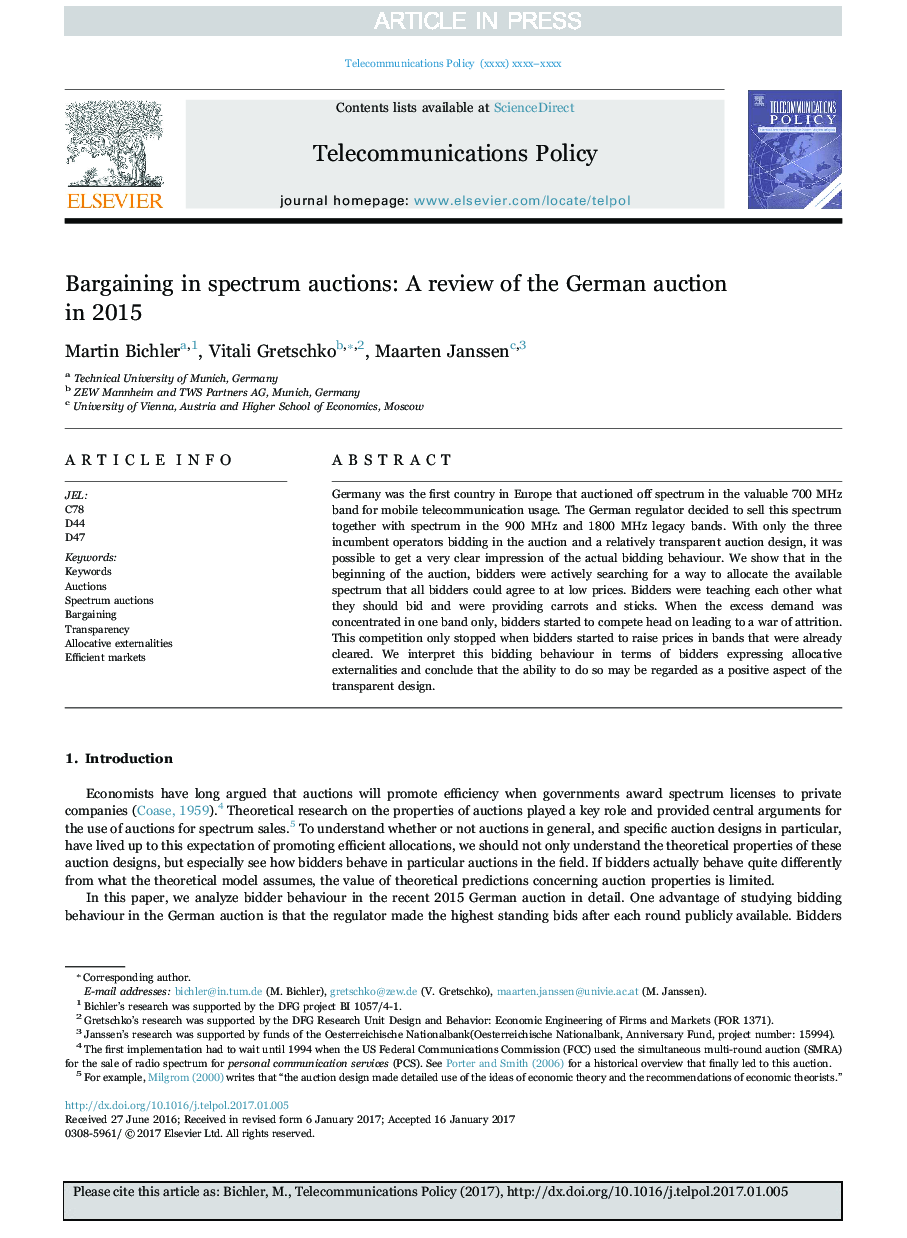| کد مقاله | کد نشریه | سال انتشار | مقاله انگلیسی | نسخه تمام متن |
|---|---|---|---|---|
| 4973284 | 1451543 | 2017 | 16 صفحه PDF | دانلود رایگان |
عنوان انگلیسی مقاله ISI
Bargaining in spectrum auctions: A review of the German auction in 2015
ترجمه فارسی عنوان
معامله در مزایده طیف: بازبینی حراج آلمانی در سال 2015
دانلود مقاله + سفارش ترجمه
دانلود مقاله ISI انگلیسی
رایگان برای ایرانیان
کلمات کلیدی
ترجمه چکیده
آلمان اولین کشور در اروپا بود که طیفی را در باند 700 مگاهرتز ارزشمند برای استفاده از تلفن همراه استفاده کرد. رگولاتور آلمان تصمیم گرفت که این طیف را با طیف در باند های 900 مگاهرتز و 1800 مگاهرتزی عرضه کند. با تنها سه اپراتور حاکم در حراج و یک طرح حراست نسبتا شفاف، ممکن است یک تصور کاملا واضح از رفتارهای پیشنهاد قیمت واقعی ایجاد شود. ما نشان می دهیم که در ابتدای حراج، داوطلبان به طور فعال در جستجوی راهی برای اختصاص طیف موجود بودند که همه داوطلبان می توانستند با قیمت پایین موافقت کنند. داوطلبان به یکدیگر تعلیم دادند که چه باید بکنند و هویج و چوب را تهیه کنند. زمانی که تقاضای بیش از حد تنها در یک گروه متمرکز بود، داوطلبان شروع به رقابت با سران خود کردند و منجر به جنگ عیب شد. این رقابت فقط متوقف شد وقتی که داوطلبان شروع به افزایش قیمت در گروههایی کردند که قبلا پاک شده بودند. ما این رفتار پیشنهاد قیمت را از لحاظ پیمانکاران بیانگر تأثیرات تخصیصی تفسیر می کنیم و نتیجه می گیریم که توانایی انجام این کار می تواند به عنوان یک جنبه مثبت از طراحی شفاف در نظر گرفته شود.
موضوعات مرتبط
مهندسی و علوم پایه
مهندسی کامپیوتر
سیستم های اطلاعاتی
چکیده انگلیسی
Germany was the first country in Europe that auctioned off spectrum in the valuable 700 MHz band for mobile telecommunication usage. The German regulator decided to sell this spectrum together with spectrum in the 900 MHz and 1800 MHz legacy bands. With only the three incumbent operators bidding in the auction and a relatively transparent auction design, it was possible to get a very clear impression of the actual bidding behaviour. We show that in the beginning of the auction, bidders were actively searching for a way to allocate the available spectrum that all bidders could agree to at low prices. Bidders were teaching each other what they should bid and were providing carrots and sticks. When the excess demand was concentrated in one band only, bidders started to compete head on leading to a war of attrition. This competition only stopped when bidders started to raise prices in bands that were already cleared. We interpret this bidding behaviour in terms of bidders expressing allocative externalities and conclude that the ability to do so may be regarded as a positive aspect of the transparent design.
ناشر
Database: Elsevier - ScienceDirect (ساینس دایرکت)
Journal: Telecommunications Policy - Volume 41, Issues 5â6, June 2017, Pages 325-340
Journal: Telecommunications Policy - Volume 41, Issues 5â6, June 2017, Pages 325-340
نویسندگان
Martin Bichler, Vitali Gretschko, Maarten Janssen,
